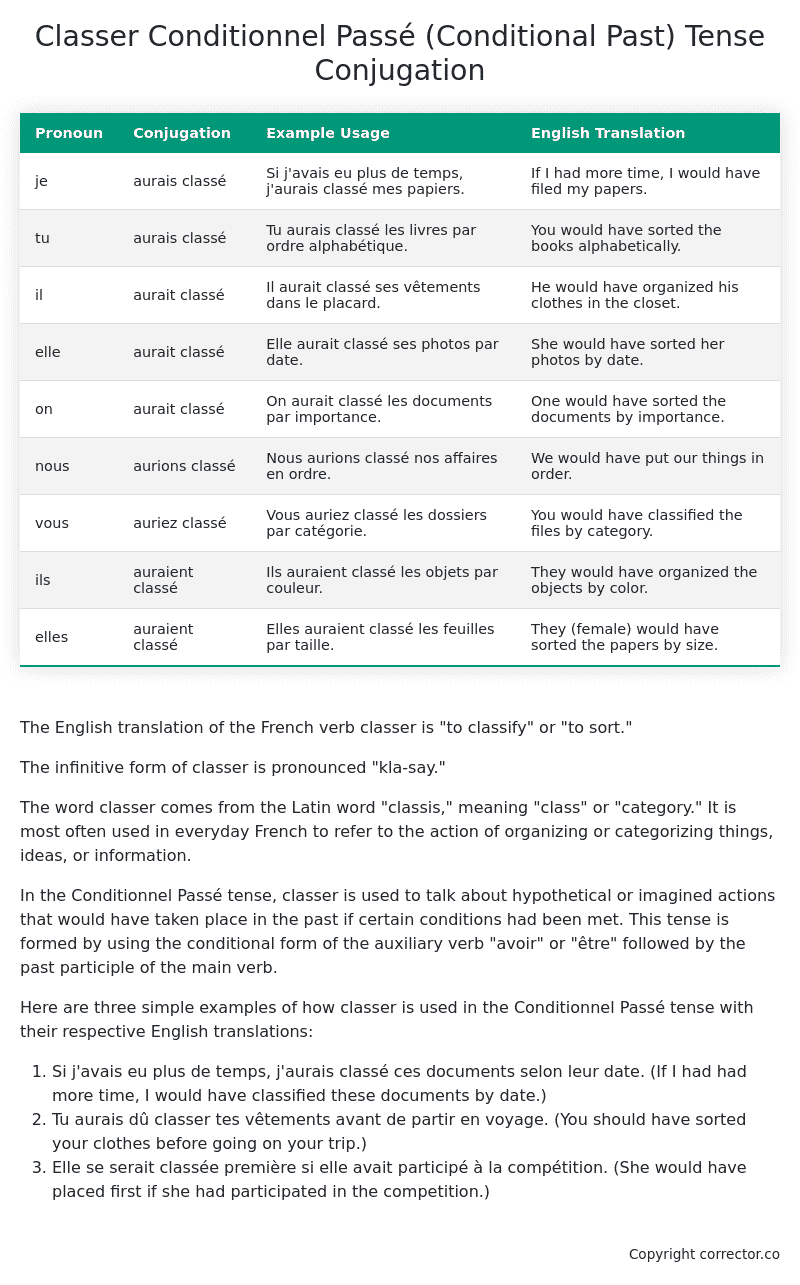Conditionnel Passé (Conditional Past) Tense Conjugation of the French Verb classer
Introduction to the verb classer
The English translation of the French verb classer is “to classify” or “to sort.”
The infinitive form of classer is pronounced “kla-say.”
The word classer comes from the Latin word “classis,” meaning “class” or “category.” It is most often used in everyday French to refer to the action of organizing or categorizing things, ideas, or information.
In the Conditionnel Passé tense, classer is used to talk about hypothetical or imagined actions that would have taken place in the past if certain conditions had been met. This tense is formed by using the conditional form of the auxiliary verb “avoir” or “être” followed by the past participle of the main verb.
Here are three simple examples of how classer is used in the Conditionnel Passé tense with their respective English translations:
- Si j’avais eu plus de temps, j’aurais classé ces documents selon leur date. (If I had had more time, I would have classified these documents by date.)
- Tu aurais dû classer tes vêtements avant de partir en voyage. (You should have sorted your clothes before going on your trip.)
- Elle se serait classée première si elle avait participé à la compétition. (She would have placed first if she had participated in the competition.)
Table of the Conditionnel Passé (Conditional Past) Tense Conjugation of classer
| Pronoun | Conjugation | Example Usage | English Translation |
|---|---|---|---|
| je | aurais classé | Si j’avais eu plus de temps, j’aurais classé mes papiers. | If I had more time, I would have filed my papers. |
| tu | aurais classé | Tu aurais classé les livres par ordre alphabétique. | You would have sorted the books alphabetically. |
| il | aurait classé | Il aurait classé ses vêtements dans le placard. | He would have organized his clothes in the closet. |
| elle | aurait classé | Elle aurait classé ses photos par date. | She would have sorted her photos by date. |
| on | aurait classé | On aurait classé les documents par importance. | One would have sorted the documents by importance. |
| nous | aurions classé | Nous aurions classé nos affaires en ordre. | We would have put our things in order. |
| vous | auriez classé | Vous auriez classé les dossiers par catégorie. | You would have classified the files by category. |
| ils | auraient classé | Ils auraient classé les objets par couleur. | They would have organized the objects by color. |
| elles | auraient classé | Elles auraient classé les feuilles par taille. | They (female) would have sorted the papers by size. |
Other Conjugations for Classer.
Le Present (Present Tense) Conjugation of the French Verb classer
Imparfait (Imperfect) Tense Conjugation of the French Verb classer
Passé Simple (Simple Past) Tense Conjugation of the French Verb classer
Passé Composé (Present Perfect) Tense Conjugation of the French Verb classer
Futur Simple (Simple Future) Tense Conjugation of the French Verb classer
Futur Proche (Near Future) Tense Conjugation of the French Verb classer
Plus-que-parfait (Pluperfect) Tense Conjugation of the French Verb classer
Passé Antérieur (Past Anterior) Tense Conjugation of the French Verb classer
Futur Antérieur (Future Anterior) Tense Conjugation of the French Verb classer
Subjonctif Présent (Subjunctive Present) Tense Conjugation of the French Verb classer
Subjonctif Passé (Subjunctive Past) Tense Conjugation of the French Verb classer
Subjonctif Imparfait (Subjunctive Imperfect) Tense Conjugation of the French Verb classer
Subjonctif Plus-que-parfait (Subjunctive Pluperfect) Tense Conjugation of the French Verb classer
Conditionnel Présent (Conditional Present) Tense Conjugation of the French Verb classer
Conditionnel Passé (Conditional Past) Tense Conjugation of the French Verb classer (this article)
L’impératif Présent (Imperative Present) Tense Conjugation of the French Verb classer
L’infinitif Présent (Infinitive Present) Tense Conjugation of the French Verb classer
Struggling with French verbs or the language in general? Why not use our free French Grammar Checker – no registration required!
Get a FREE Download Study Sheet of this Conjugation 🔥
Simply right click the image below, click “save image” and get your free reference for the classer Conditionnel Passé tense conjugation!

Classer – About the French Conditionnel Passé (Conditional Past) Tense
Formation
Common Everyday Usage Patterns
Expressing Unreal Past Scenarios
Polite Requests or Suggestions
Expressing Doubt or Uncertainty
Interactions with Other Tenses
Conditional Present
Indicative Past Tenses
Conditional Future
Summary
Want More?
I hope you enjoyed this article on the verb classer. Still in a learning mood? Check out another TOTALLY random French verb conjugation!


